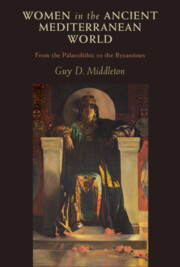Book contents
- Women in the Ancient Mediterranean World
- Women in the Ancient Mediterranean World
- Copyright page
- Dedication
- Epigraph
- Contents
- Preface
- Acknowledgements
- Timeline
- Historical Contexts
- Introduction
- Part I The Deep Past
- Part II The Bronze Age
- Part III The Iron Age
- 12 Naunakhte
- 13 Herse
- 14 Pkpupes
- 15 Atossa
- 16 The Princess of Vix
- 17 Aristonice
- 18 Neaira
- 19 Phanostrate
- Part IV The Hellenistic Worlds
- Part V The Age of Empire
- Notes
- Select Bibliography
- Index
18 - Neaira
from Part III - The Iron Age
Published online by Cambridge University Press: 19 January 2023
- Women in the Ancient Mediterranean World
- Women in the Ancient Mediterranean World
- Copyright page
- Dedication
- Epigraph
- Contents
- Preface
- Acknowledgements
- Timeline
- Historical Contexts
- Introduction
- Part I The Deep Past
- Part II The Bronze Age
- Part III The Iron Age
- 12 Naunakhte
- 13 Herse
- 14 Pkpupes
- 15 Atossa
- 16 The Princess of Vix
- 17 Aristonice
- 18 Neaira
- 19 Phanostrate
- Part IV The Hellenistic Worlds
- Part V The Age of Empire
- Notes
- Select Bibliography
- Index
Summary
Neaira was supposedly a prostitute who sold her body for sex; she was also, in our single source for her life, a courtesan, a concubine, or ‘that sort of woman’.1 These labels are pejorative ones, carrying the moral and social judgements of the male-authored ancient Greek sources – no prostitute from classical Greece has left us her own testimony. But we could also choose other terms for Neaira that would fit her at various points in her life: she was a child, a girl, a woman, a sex slave, a victim, a partner, a lover, an opportunist, a mother, and above all, perhaps, a survivor.2 Whilst all those labels we can apply may fit, she herself, her character and emotions, her aspirations and motivations remain elusive; some are given to us by a man, Apollodorus, who is using her story for his own ends – hardly a disinterested source. Even though we lack her own words and her physical remains, her story, shadowy as it is, is still worth exploring as a life as valuable as any other and therefore worthy of remembrance and sympathy.
- Type
- Chapter
- Information
- Women in the Ancient Mediterranean WorldFrom the Palaeolithic to the Byzantines, pp. 149 - 154Publisher: Cambridge University PressPrint publication year: 2023

